
April 13, 2016 • No. 12 | PDF Previous Issues
The Foreign Minister Must Resign!
No to the Arms Sales to Saudi Arabia!
No to the “New Doctrine” Called
“Responsible Conviction!”
The Marxist-Leninist Party of Canada condemns Canada’s sale of arms to Saudi Arabia for which this government signed export permits on April 8. No matter what the pretext, these arms sales are unacceptable. By no stretch of the imagination can Saudi Arabia be considered a peaceful or a democratic country as the ministry and Trudeau government claim. Nor can Canada’s mission in the Middle East be considered a peaceful one. This is simply not true.
 The example of the arms deal to Saudi Arabia was given by the Foreign Minister in a speech at the University of Ottawa on March 29, to vindicate the new government doctrine called “responsible conviction.” On that occasion, the Minister created the impression that the arms sale was a done deal by the previous Harper government. He said it would not be right for Canada to go back on its signature due to harmful consequences. He repeated that Canada’s aim is to bring stability to the region and advanced various other pragmatic excuses to justify aggression and war.
The example of the arms deal to Saudi Arabia was given by the Foreign Minister in a speech at the University of Ottawa on March 29, to vindicate the new government doctrine called “responsible conviction.” On that occasion, the Minister created the impression that the arms sale was a done deal by the previous Harper government. He said it would not be right for Canada to go back on its signature due to harmful consequences. He repeated that Canada’s aim is to bring stability to the region and advanced various other pragmatic excuses to justify aggression and war.
Now it turns out that Dion signed the papers himself on April 8. He has to be held to account for trying to mislead Canadians on this matter since the beginning of January and again on March 29.
Attempts to prettify selling arms to a country such as Saudi Arabia by claiming that they are contributing to peace and stability in the region is nonsense. Furthermore, for Canada to have such a self-serving foreign minister is not acceptable. He has shown he is willing to address questions of war and peace, about which Canadians are very concerned, in a deceitful way. This is not right or acceptable. A person who has a clear conscience does not resort to such double talk and shenanigans.
The MLPC calls on Canadians who treasure their right to conscience to condemn the sale of arms to Saudi Arabia, condemn the new doctrine called “responsible conviction” and condemn this Minister’s deceit. The MLPC also calls on Canadian Liberals in whose name this Minister is acting to step forward and tell us whether this new doctrine called responsible conviction to justify reprehensible behaviour is what they stand for. Finally, the MLPC calls on Canadians to demand the Minister’s resignation, now!
Note
To read about the so-called new doctrine called Responsible Conviction see the TML Weekly article entitled “‘Responsible Conviction’ — Another Criminal Doctrine of Canada’s Foreign Affairs to Justify Aggression and War,” available here.
Foreign Minister Signs Export Paperwork for Armoured Vehicles to Saudi Arabia
Minister of Foreign Affairs Stéphane Dion signed papers authorizing export of the bulk of a $14.8 billion deal to sell Canadian-made armoured vehicles to Saudi Arabia on April 8, the Globe and Mail reports. The authorization was revealed by releases from the Department of Justice on April 12 in response to a federal lawsuit launched by Montreal law professor Daniel Turp against Dion. Turp’s lawsuit claims that issuing export permits would violate Canada’s Export and Import Permits Act as well as the Geneva Conventions Act and that the Minister would exceed his jurisdiction or be acting without competence by signing the permits.[1]
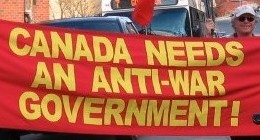 The documents are stamped “Secret” and reveal the government’s reasoning for supporting the deal. They also put the lie to the government’s claim that it is a “done deal” and the Liberals are supporting it out of fear for the consequences of breaking a contract. Minister of Foreign Affairs Dion’s signature appears next to the words “I concur” and a recommendation for six permits to “export LAVs and their associated weapons systems, spare parts and technical data to Saudi Arabia” covering $11 billion of the total $14.8 billion.
The documents are stamped “Secret” and reveal the government’s reasoning for supporting the deal. They also put the lie to the government’s claim that it is a “done deal” and the Liberals are supporting it out of fear for the consequences of breaking a contract. Minister of Foreign Affairs Dion’s signature appears next to the words “I concur” and a recommendation for six permits to “export LAVs and their associated weapons systems, spare parts and technical data to Saudi Arabia” covering $11 billion of the total $14.8 billion.
The Globe states that many critics of the agreement thought the previous government had already signed such permits. It reports that according to Canada’s arms sales regime, transactions can only proceed after the federal government has issued export permits. The previous government “had only approved minor permits for the export of technical data. “Dion and his department insinuated that the export permits for the deal were already signed under the previous government when they continually issued statements about how they would take a different approach to export permits in the future.
At his speech at the University of Ottawa on March 29 announcing the government’s “Responsible Conviction” doctrine Dion said:
“Here is what needs to be done: export permits for this type of equipment must be examined rigorously and with greater transparency by the Minister of Foreign Affairs, in consultation with the Minister of International Trade, in order to assess whether they will be used in a manner that is consistent with international law, with human rights and with our national interests. This is what the Prime Minister asked of me and I am working on it with my officials. That is what responsible conviction demands.”
Official Support for Criminal Saudi War Against Yemen
Global Affairs, the new name given by the Liberals for the Canada’s Department of Foreign Affairs issued a memo on March 21 requesting Dion’s approval of the export permits. The Globe reports that “the department of Global Affairs recommended approval of the Saudi export permits because it could help Saudi Arabia wage war in neighbouring Yemen.” The memo says the armoured vehicles, equipped with machine guns and anti-tank weapons will help Saudi Arabia in “countering instability in Yemen as well as fighting Islamic State threats.”[2] It further covers up the use of Canadian weaponry in Saudi Arabia’s 2011 military intervention in Bahrain to quell protests by claiming that the Saudis were only there to “protect key buildings and infrastructure.”
 “The acquisition of state-of-the-art armoured vehicles will assist Saudi Arabia in these goals,” the memo states. The memo notes that the only parties consulted before recommendations were made were the Department of National Defence, offices within Global Affairs and Innovation, Science and Economic Development Canada. The “rigorous examination” was reduced to a claim from Global Affairs that “No concerns were raised.” The memo said, “There has been no indication that equipment of Canadian origin, including light armoured vehicles, may have been used in acts contrary to international humanitarian law.”
“The acquisition of state-of-the-art armoured vehicles will assist Saudi Arabia in these goals,” the memo states. The memo notes that the only parties consulted before recommendations were made were the Department of National Defence, offices within Global Affairs and Innovation, Science and Economic Development Canada. The “rigorous examination” was reduced to a claim from Global Affairs that “No concerns were raised.” The memo said, “There has been no indication that equipment of Canadian origin, including light armoured vehicles, may have been used in acts contrary to international humanitarian law.”
The Globe also reported earlier this year that vehicles matching Canadian-made LAVs already purchased by Saudi Arabia have been photographed in use in Yemen. A CBC report in February showed that Canadian-made sniper rifles were also in use by Saudi forces in Yemen.
U.S.-supplied bombs were found by human rights groups to have been used in March 15, 2016 Saudi airstrikes on a market that killed more than 100 people and 25 children. The head of the UN Human Rights Committee Zeid Raad Al Hussein said in March 2016 that Saudi forces had killed thousands of civilians. “They have hit markets, hospitals, clinics, schools, factories, wedding parties – and hundreds of private residences in villages, towns and cities including the capital, Sanaa.” Attempts at launching ground incursions into Yemen and taking territory by Saudi forces were repelled by Yemenis on numerous occasions despite the humanitarian disaster they have inflicted on the country.
Saudi Arabia launched its bombardment and invasion of Yemen just over one year ago, on March 26, 2015. Millions of Yemenis demonstrated on the anniversary to demand an end to the war and the removal of foreign aggressors.
Notes
1. To read the application from Daniel Turp to the Minister of Foreign Affairs, click here.
2. For more information about the Saudi war against Yemen, see:
“The Example of Yemen,” Renewal Update, February 22, 2016.
“U.S. Authorizes Saudi Arabian Military Aggression,” TML Weekly, March 28, 2015.
“The Geopolitics Behind the War in Yemen,” Mahdi Darius Mazemroaya, TML Weekly, April 11, 2015.
Prime Minister’s Glib Response to Unemployed Workers
in Calgary
Crass Pretense of Sharing Weal and Woe with Unemployed Workers
On March 29 Prime Minister Justin Trudeau was in Calgary for a roundtable with unemployed workers some of whom are coming to the end of their Employment Insurance (EI) benefits. Many of those who participated are laid off energy workers who will now be left with neither a job nor any income. What are they to do? Anyone who is, has been or is at risk of being in this position, or have family, friends and co-workers in such a position, wants an answer to this question.
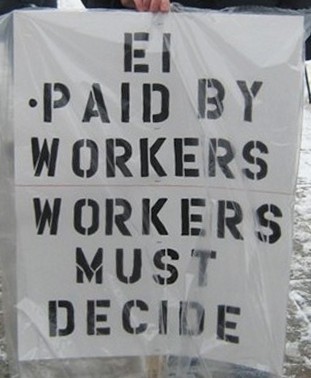 A roundtable participant questioned why the targeted benefits introduced in the 2016 budget only apply to unemployed workers in Calgary but not Edmonton. This is a legitimate question given that workers in both cities are suffering unemployment and a lack of prospects as a result of the collapse of the energy sector. It has nothing to do with where they live but the sector in which they work.
A roundtable participant questioned why the targeted benefits introduced in the 2016 budget only apply to unemployed workers in Calgary but not Edmonton. This is a legitimate question given that workers in both cities are suffering unemployment and a lack of prospects as a result of the collapse of the energy sector. It has nothing to do with where they live but the sector in which they work.
The government’s formula to determine “affected regions” is based on regions where the unemployment rate increased by two per cent or more for a sustained period between March 2015 and February 2016, compared to its lowest point between December 2014 and February 2015, “without showing significant signs of recovery.” This is what the government calls an “unemployment shock” and is supposed to explain why workers who live in Calgary will now get more EI than those who live in areas deemed not to be suffering an “unemployment shock.”
Calgary is one of the “affected regions” identified by the government’s formula due to its two per cent increase in official unemployment figures in a short period of time. In Edmonton the unemployment rate went up 1.8 per cent during the period in question. As a result, workers who live in Edmonton and other places who lost their jobs from the same employers as those who happen to live in Calgary or other parts of the country, receive different treatment because there are allegedly more jobs available where they live.
This calculation is not only irrational but inhuman since it does not address the conditions the workers are facing in any real or humane way.
Trudeau feigned personal concern for the hardships of others, as if he was in Alberta to announce a personal charity but alas, there was no money attached to his pretense. “As effective as a government can be in addressing large systemic problems, the very scale of the challenges we’re facing sometimes leave me as an individual wishing I could do more to help every single person that I get to hear from directly,” Trudeau said.
 To pretend that his government recognizes unemployed workers as real flesh and blood people Trudeau said, “These are people who embody hope and hard work. People who have supported Canada’s economy and have now fallen on difficult times and need their country to be there for them.” Having raised the expectation that they can count on him and his government “to be there for them,” he milked the situation further by saying he understands that many Canadians feel as though the rug has been pulled out from under them.
To pretend that his government recognizes unemployed workers as real flesh and blood people Trudeau said, “These are people who embody hope and hard work. People who have supported Canada’s economy and have now fallen on difficult times and need their country to be there for them.” Having raised the expectation that they can count on him and his government “to be there for them,” he milked the situation further by saying he understands that many Canadians feel as though the rug has been pulled out from under them.
He then betrayed his crass pretense of concern when he uttered a gem about how “both people in Edmonton and Saskatchewan should be pleased that they are not hit as hard as other parts of the country and indeed the province have been,” and thus have been legitimately denied the EI benefits they so desperately require.
Workers are in no mood to accept arbitrary decisions where the government picks and chooses which workers will get some small level of assistance and who will be hung out to dry. Workers are not looking for Trudeau’s crocodile tears or personal charity, let alone such despicable condescension as to be told they should be grateful that things are not worse.
We live in a socialized economy, where production is social but workers who produce the wealth have no control over the decisions about what is produced, how it is produced and how the wealth should be used. Workers’ rights to a livelihood as the producers of the wealth are not provided with a guarantee. Trudeau is the Prime Minister but his position of power and privilege exempts him from knowing what it is like to suffer the fate of the unemployed workers. Far from it, his remarks are to cover up that the budget is all about paying the rich, not fulfilling the needs of the people.
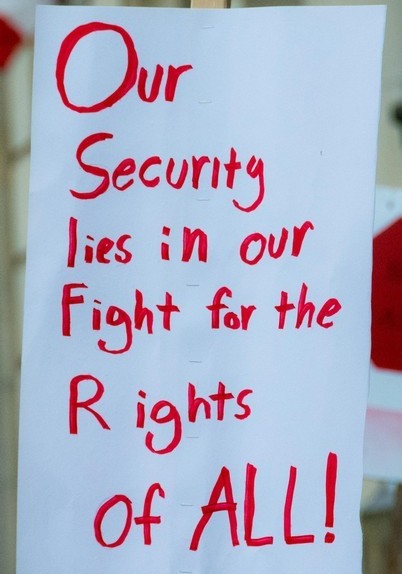 The workers soundly denounced the glib performance of Prime Minister Trudeau in Alberta. Meanwhile, the monopoly media sought to divert them by making the issue one of the government’s formula to provide extended EI to some workers and not others.
The workers soundly denounced the glib performance of Prime Minister Trudeau in Alberta. Meanwhile, the monopoly media sought to divert them by making the issue one of the government’s formula to provide extended EI to some workers and not others.
What Justin Trudeau’s glib comments really show, however, is that he is too clever by half. He does not share weal and woe with the workers and thus really has no right to speak to them about their conditions and what it is like to be them. The workers cannot entrust their fate to those who are aloof from their reality and concerns.
What happened in Calgary is what will happen to Justin Trudeau and his ministers every time they go amongst the people to tout the Trudeau government’s pay-the-rich schemes in the name of Canadians and their interests. The fraud will be revealed.
We can expect that sooner rather than later his roadshows amongst ordinary people will be replaced by staged photo ops and avoidance of all attempts to be held to account à la Harper. This is already taking place in the Parliament when the Budget Officer demands concrete information about the budget.
To Whom Should Unemployed Workers
Entrust Their Fate?
When Justin Trudeau visited Calgary and Edmonton from March 29 to April 1, he held small “roundtables” on Employment Insurance (EI) and met with a few students at the Southern Alberta Institute of Technology in Calgary. His visit was the occasion for photo ops to promote changes to EI benefits in the federal budget.
The Liberal government has decided that beginning July 1, 2016 and ending July 1, 2017, EI recipients will be eligible for an additional five weeks of benefits in 12 regions where the unemployment rate has spiked. Workers in these regions who have never made an EI claim in their entire working life would be eligible for up to 20 weeks of extended benefits. Newfoundland and Labrador, all of Alberta except the Edmonton region, northern British Columbia, northern Manitoba, northern Ontario, northern Saskatchewan, Whitehorse and Nunavut are included.
Alberta’s unemployment rate was 7.9 per cent in February, for a total of 194,300 people out of work. This does not include the tens of thousands of workers who commuted to Alberta for work or lived in the camps around Ft. McMurray who are now unemployed. Calgary has been particularly hard hit, with an official unemployment rate of 8.4 per cent.
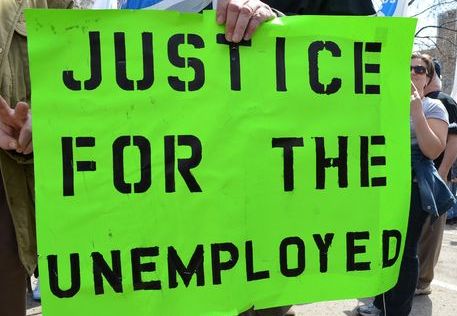 Of the close to 200,000 people out of work in Alberta, only 62,480 or 37 per cent qualified for EI as of December 2015. Many workers whose work is precarious, who work part-time or at occasional “gigs” don’t have enough hours to qualify. Many workers in the oil patch and the oil sands are hired by the energy and construction monopolies as “independent contractors” and don’t qualify for EI at all. Some must use up their severance before qualifying, while others will have now exhausted their benefits. For the majority of the unemployed, the changes do nothing to assist them.
Of the close to 200,000 people out of work in Alberta, only 62,480 or 37 per cent qualified for EI as of December 2015. Many workers whose work is precarious, who work part-time or at occasional “gigs” don’t have enough hours to qualify. Many workers in the oil patch and the oil sands are hired by the energy and construction monopolies as “independent contractors” and don’t qualify for EI at all. Some must use up their severance before qualifying, while others will have now exhausted their benefits. For the majority of the unemployed, the changes do nothing to assist them.
No matter, Trudeau used his visit to peddle the changes as examples of how the Liberals are supposedly making good on their electoral promises. During the October 2015 election an impression was created that the Harper government’s odious EI reforms would be rescinded and unemployed workers would be protected. The Liberals’ election platform stated that they would “strengthen the Employment Insurance system to make sure that it works for our economy and for all Canadians.”
The Liberal platform stated:
“Starting in 2017, we will reduce the waiting period for benefits. When a worker loses their job and applies for Employment Insurance, they will only be without income for one week, not two.
“We will also reverse Stephen Harper’s 2012 EI reforms that force unemployed workers to move away from their communities and take lower-paying jobs.
“We will ensure that the Employment Insurance system is providing real income security to workers, including those with precarious work.”
In fact, the Liberal track record on employment insurance is not good and new reforms only compound the problem.
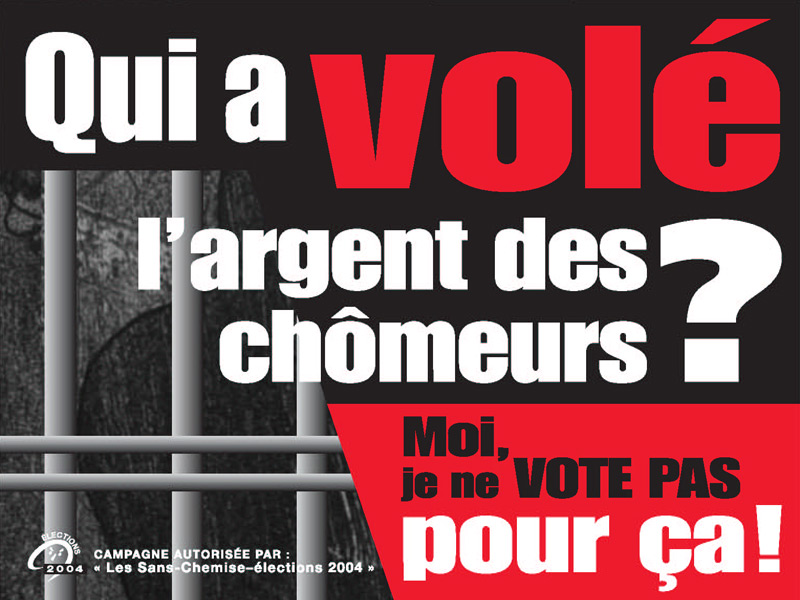
2004 Placard asks who stole the money from the unemployed after money for EI transfered into general revenues.
It was Paul Martin when he was Minister of Finance in the Chrétien government who absconded with the workers’ EI funds and put them into general revenues to make them available to pay the rich (by paying down debts and deficits), while increasing the threshold to qualify for EI and decreasing the amount of benefits, despite a so-called jobless recovery at the time. The Trudeau reforms are merely some insubstantial modifications to those of the Harper government. Most importantly, the Liberals have preserved the anti-social essence of the Harper government’s changes and do not address the main demand of Canadians which is that when workers become unemployed through no fault of their own they should be looked after, end of story.
Every worker has the right to a livelihood. It is the government’s responsibility to fully mobilize society’s resources to solve the country’s economic problems, as well as adopt pro-social policies to deal with problems such as unemployment. Unemployed workers and their families must not be left to fend for themselves. It is a principle, not a policy objective. The facts show that the workers can only entrust themselves to sort out the problems they and their families face. To find a way forward, this is a matter which workers from coast to coast need to deliberate on.
For Your Information
Changes to the Employment Insurance Regime in
Budget 2016
The Liberal budget tabled on March 22 makes various changes to the Employment Insurance (EI), while continuing a number of the anti-social reforms introduced by the Harper government.
The budget identifies 12 “affected regions” which according to a government formula, have experienced a sudden loss of jobs the government calls an “unemployment shock.” Workers in these regions are eligible for between five and 20 “extra” weeks of EI. It also proposes to spend $21 million to “improve” the policing of the EI program which it calls “strengthening its integrity.” This is to cover up that the cause of any shortfall in the fund is not phoney claims but rather that governments have absconded with EI funds for self-serving schemes, something which the Liberals are past masters at.
Eligibility
As of July 2016 eligibility rules for new applicants for EI will change. Those who have claimed EI before can qualify with fewer hours than the standard 910 hours that is currently required for”new-entrants” and “re-entrants” to the system. However, the lower threshold is determined by city and is not an objective number of hours for the entire country.
Extended benefits will be available for one year starting in July 2016, with the measure being applied retroactively to all eligible claims as of January 4, 2015.
Budget 2016 also proposes to make legislative changes to give an additional 20 weeks of EI regular benefits to “long-tenured workers” in the same 12 EI economic regions, up to a maximum of 70 weeks of benefits. A long-tenured worker is defined as someone who is a EI regular or fishing benefits claimant and who has paid at least 30 per cent of the annual maximum EI premium in at least seven of the past ten years and, over the last five years, has received 35 weeks or less of EI regular and/or fishing benefits.
These extended benefits for long-tenured workers will be available for one year starting in July 2016, with the measure being applied retroactively to all eligible claims as of January 4, 2015.
Waiting Period
Effective January 1, 2017 the waiting period to start receiving EI benefits will be reduced from two weeks to one.
Extending “Working While on Claim” Pilot Project
Budget 2016 proposes to extend the current “Working While on Claim” pilot project, brought in by the Harper government, until August 2018. Under the project, claimants can keep 50 cents of their EI benefits for every dollar they earn, up to a maximum of 90 per cent of the weekly insurable earnings used to calculate their EI benefit. These measures are ostensibly aimed at “incentivizing” people to work more while on claim, implemented as part of the Harper government’s overall aim to kick unemployed workers off of the EI regime.
Job Search
In 2012, changes were made to the EI program to specify the type of jobs that unemployed workers are expected to search for and accept as part of the Harper government’s broad anti-social reforms to EI. Workers have been forced to carry out job searches and in some cases accept work at poverty level wages far from home. The measures also force claimants to keep on file for up to six years their daily record of job searches, which they could be called on to produce at any time. Budget 2016 proposes to reverse the changes that strictly define the job search responsibilities of unemployed workers, but maintain the job search requirement. The government says the budget will also ensure that there are “fair and flexible supports to assist EI claimants train for and find new employment.”
Extending Maximum Duration of Work-Sharing Agreements
The work-sharing program is “an adjustment program designed to help employers and employees avoid layoffs when there is a temporary reduction in the normal level of business activity that is beyond the control of the employer.” The government states that the measure provides income support to employees eligible for EI benefits who work a temporarily reduced work week while their employer recovers.
Budget 2016 proposes to extend the maximum duration of work-sharing agreements from 38 weeks to 76 weeks across Canada. It claims that by extending work-sharing agreements employers retain skilled employees and avoid the costs of recruiting and training new employees when business returns to normal levels. They also enable employees to continue working and maintain their skills while supplementing their wages with EI benefits for the days they are not working.
Employment Insurance Service Delivery
The budget states: “Between December 2014 and December 2015, EI claims increased 7.8 per cent and the number of EI beneficiaries increased 7.3 per cent nationally. To ensure that Canadians get timely access to the benefits to which they are entitled, Budget 2016 proposes to provide $19 million in 2016-17 to enable Service Canada to meet the increased demand for EI claims processing, and offer better support to Canadians as they search for new employment.”
Enhancing Access to Employment Insurance Call Centres
“EI Call Centre agents provide support to Canadians who require assistance to submit EI claim information or need to check the status of their EI claims. Budget 2016 proposes to invest $73 million over two years, starting in 2016-17, to improve access to EI Call Centres. This investment will increase the number of call centre agents, which will reduce waiting times and ensure that Canadians can access the information and support they need to receive their EI benefits as quickly as possible.”
“Strengthening the Integrity of the Employment Insurance Program”
The Budget states: “Canadians expect sound stewardship and accountability of the EI program, which is funded through premiums paid by employers and workers. To ensure that benefits help those in need, Budget 2016 proposes to direct $21 million over three years, starting in 2016-17, to promote compliance with program rules.”
There is not even a recognition of the fact that both the Liberals and Conservatives have misappropriated money from the EI fund for self-serving purposes. Instead it appears as if the Liberals are going to take $21 million out of the fund for some policing regime as if the workers are the problem.
Future Changes
The budget indicates that the government is committed to further improving EI. “This includes making Compassionate Care Benefits easier to access, more flexible and more inclusive for those who provide care for seriously ill family members, and providing more flexibility in parental leave benefits to better accommodate unique family and work situations.” These objectives are “to be advanced over the course of the Government’s mandate.”

